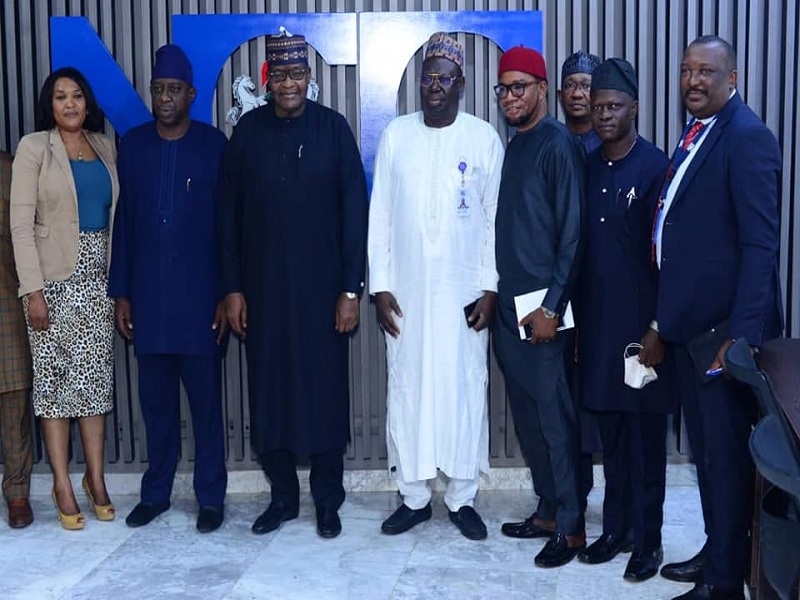Telecom
2021 Library Day: Danbatta Urges Digitisation of Knowledge Resources and Improved Reading Culture

Professor Umar Garba Danbatta, executive vice chairman and chief executive officer (EVC/CEO), Nigerian Communications Commission (NCC), has called on private and public institutions to leverage Information and Communication Technology (ICT) to digitise their hard copy knowledge materials to make them more efficiently accessible to their workforce and external stakeholders.

Danbatta made the call on Wednesday, June 23, 2021, when the Commission joined the rest of the world to celebrate the 2021 Library Day with the theme: “Welcome to Your Library.”
Speaking at the event, held at the NCC Head Office in Abuja, the EVC expressed dismay at the dwindling book-reading culture in Nigeria, calling for a positive change of attitude in the nations’ reading culture.
He said while ICT has helped in digitizing a large number of hitherto hard-copy books available to people, efforts must be made to access these materials as well as other hard-copy books to read.
He said this has become central because the knowledge economy being driven by ICT requires reading and intellectual development for further advancement.
Danbatta underscored the importance of the library as a great resource with a variety of stocks reflecting the multi-functional structure of the Commission, the significance of which cannot be over-emphasized in the activities of the Commission as well as in a knowledge economy.
“As a regulator of a dynamic telecommunications industry, the Commission gives pride of place to library resources to ensure that it is abreast of current information, regulatory trends and international best practice in carrying out its mandate,” Danbatta said.
The EVC further noted that it is the first ‘Library Day’ celebration holding since the establishment of the Commission’s library in 2003, noting that as an administrator and a Professor with many years of experience in the academia, he fully appreciates the role of a modern library in enabling research and new knowledge for organisational success.
He added that the NCC’s library was established to provide the necessary literature and knowledge materials to facilitate access to learning and dissemination of information.
“The NCC library is 18 years now and it is a cutting-edge repository of knowledge and information with over 1,000 technical books in hard and soft copies aside other materials serving both internal and external stakeholders.”
“It is a reflection of who we are, where we are and the library stock is an indication of the diverse areas of specialisation, expertise and operations of the Commission,” the EVC said.
While pointing out that various efforts have been made, over the years, to reposition the library to meet international standard, Danbatta noted that remarkable improvements have been made in uplifting the standard of the library not only in stocking it with latest useful books but also in terms of automation for easier accessibility.
“The NCC has leveraged the power of Information and Communication Technology (ICT) to provide the electronic section to enhance the library information system by migrating from analogue to digital, thereby enabling access to remote databases electronically. It is a learning resource that has varieties, currency, quality and content of stock,” he added.
He emphasised the need to reinvigorate the passion for learning, which he said, will lead to new and better ways of doing things as well as better collaborations in carrying out assigned responsibilities.
Danabatta noted that the library is critical to realising his dream of sustaining the culture of the Nigerian Communications Commission as a respected learning organisation with best-in-class employees.
The Library Day celebration promotes the idea that libraries extend far beyond the four walls of a building and that everyone is welcome to use their services.
At the event, goodwill messages were received from the President, Nigerian Library Association (NLA), Prof. Innocent Isa Ekoja, represented by the NLA’s National Secretary, Omoh Atesenokhai, and a representative of the Central Bank of Nigeria (CBN), Isaac Olubisi Ajibola.
The NLA is the national association of library and information professionals and the recognised group for librarians working in Nigeria in both private and public sectors in Nigeria.
Telecom
NCC Orders Telcos Inform Subscribers of Data Breach within 48 Hours

Nigerian Communications Commission (NCC) has directed telecom operators in the country to notify affected customers of any data breach within 48 hours ( that is two day) of detecting such unauthorised infringement.

This directive was contained in the revised Internet Code of Practice 2026 by the NCC, on Friday.
The document seeks to define the rights and obligations of telecom operators in handing the rights of internet users to an open internet.
In the move to protect customer information, Mobile Network Operators (MNOs) and Internet Service Providers (ISPs) are to take necessary measures to protect customers’ data from unauthorised use, disclosure, access or breach.
Telecom operators must now notify affected customers within 48 hours of detecting a compromise through text message, email or any other effective means. As contained in Chapter 3.4 of the regulation titled “Data Breach Notifications,”
The telecoms companies are also directed to notify the NCC of such a breach not later than 48 hours after determining such a breach.
“Where full details of the breach are not immediately available, the provider shall issue a preliminary notification within the same period and furnish a comprehensive update within Fourteen (14) days thereafter, or within such extended period as the Commission may approve,” part of the section reads.
The guidelines, according to NCC, are in tandem with the provisions contained in the Nigerian Data Protection Act 2023 and Part VI of Schedule 1 of the Consumer Code of Practice Regulations 2024.
The regulation also joins other agencies’ policies, ensuring protection. Agencies such as the Nigeria Data Protection Commission (NDPC) and the Federal Competition and Consumer Protection Commission (FCCPC) protect consumers against misuse of personal data, identity theft, financial loss, and reputation damage.
The review comes at a time when privacy becomes core amid frequent breaches and illegal harvest of data such as biometric, national IDs, financial information, traffic and usage, and others.
Regulations are necessary for the proper handling, consent, and regulatory compliance regarding sensitive data, ensuring it is only processed for legitimate purposes.
Under Chapter 3.5, the Internet Code of Practice 2026 addressed the handling of harvesting of transactional data by notifying and getting approval from the NCC of any usage by a third party. It noted that the NCC approval will be defined by a review and assessment of such access and “its potential effects on national considerations, consumer information and personal data.”
Telecom
Globacom Promotes Valentine Gifting with Huge Discounts on Smartphones

Globacom has announced a Valentine Smartphone promotion, which provides incredible savings on a variety of high-end smartphones from top manufacturers including Tecno, Samsung, and Infinix.

Starting on February 9, the promotion provides substantial price reductions on a number of Samsung models, including the Galaxy Z Fold 7, Galaxy A07, Galaxy A56 5G, Galaxy A36 5G, and Galaxy A26 5G. Customers who buy any of the phones will also receive a complimentary travel pouch and charger, as well as up to 18GB of extra data for six months, only available on the Glo network.
Along with other Infinix models, Tecno devices are also offered at attractive discounts, giving customers a large range of smartphones to fit a variety of tastes and price ranges.
The goal of the Glo Valentine promotion is to provide customers with the best possible deals on carefully chosen smartphones that are renowned for their cutting-edge technology, stylish designs, and dependable performance. The offer, which includes alternatives to suit a range of budgets and lifestyles, reaffirms Globacom’s dedication to customer happiness, digital adoption, greater data usage, and client centricity.
The company revealed that the promotion aligned with customers’ expectations during celebratory seasons, when demand is highest for quality smartphones at affordable prices. The company added that its partnership with trusted global and regional brands such as Samsung, Infinix, and Tecno ensures that customers enjoy premium features without compromising on value.
“The Valentine season is about connection, and what better way to stay connected than with a smartphone that fits your needs and aspirations,” the company stated. “This promo gives our customers the chance to get their dream smartphones at some of the best prices of the year, along with generous data bonuses to keep them connected,” the company disclosed.
Customers are encouraged to visit Gloworld outlets nationwide to take advantage of the Valentine Smartphone Promo while stocks last.
Telecom
GBB Expands Broadband to 13 Underserved Communities In 2025

Galaxy Backbone Limited (GBB) has recorded a significant milestone in Nigeria’s digital transformation journey by advancing broadband connectivity to 13 underserved institutions and communities nationwide in 2025, reinforcing its position as the nation’s digital backbone and a trusted partner in national development.

Guided by its mandate to enable a digitally inclusive Nigeria, GBB deliberately extended connectivity to locations within reach of its infrastructure footprint, particularly institutions with strong potential for productive use but limited readiness for immediate commercial engagement. Through this effort, the organisation continues to unlock opportunity, stimulate innovation, and support sustainable growth across critical sectors of the economy.
The expansion reached three Federal Universities, two Local Government Areas, and eight Federal Secretariats, strengthening digital capabilities in education and public administration while enhancing service delivery across the country.
GBB also extended reliable broadband connectivity to strategic and cultural landmarks such as the Nnamdi Azikiwe International Airport, Abuja, underscoring its commitment to supporting national infrastructure that drives economic activity, mobility, and global connectivity.
These deployments highlight Galaxy Backbone’s resolve to bridge the digital divide and empower institutions that shape Nigeria’s future. They demonstrate the measurable national impact of GBB’s infrastructure investments and reflect the tangible progress of the Integrated Digital Transformation Strategy (IDTS), further solidifying the organisation’s role as the platform upon which government institutions and communities can confidently build their digital future.
More importantly, the milestone illustrates that GBB’s work extends beyond technology by enabling education, improving governance, supporting economic participation, and connecting citizens to opportunity.
The initiative aligns with the Federal Government’s broadband penetration objectives and complements national programmes such as Project 774 – Universities’ Hostel Connectivity, ensuring coordinated, scalable, and sustainable impact across the country. Commenting on the achievement, Galaxy Backbone noted that every new connection brings Nigeria closer to a more inclusive digital economy while reinforcing the infrastructure required for innovation and national competitiveness.
As implementation continues, GBB remains committed to expanding access, pushing boundaries, and delivering on the promise of a fully digital nation, with further updates expected as additional phases of the deployment progress.
Galaxy Backbone Limited is the Federal Government’s digital infrastructure and shared services provider, dedicated to delivering secure, reliable, and scalable ICT solutions that support efficient governance, innovation, and sustainable national development.

 E-Financial3 days ago
E-Financial3 days agoNAICOM Targets Resilient, Global Competition Market in Insurance Sector Consolidation

 News3 days ago
News3 days agoNITDA Explores Partnership with Trust Stamp on Digital Trust and Innovation

 Telecom3 days ago
Telecom3 days agoNCC Orders Telcos Inform Subscribers of Data Breach within 48 Hours

 E-Financial3 days ago
E-Financial3 days agoIGP Designates Banks National Security Asset, Orders Crackdown on Cyber Frauds

 General News3 days ago
General News3 days agoCybersecurity Firm Warns Against Gift Card Scams @ Saint Valentine’s Day

 E-Financial3 days ago
E-Financial3 days agoRashidat Adebisi Unveils Strategic Roadmap for Nigeria’s Insurance Sector under NIIRA 2025

 Telecom3 days ago
Telecom3 days agoGlobacom Promotes Valentine Gifting with Huge Discounts on Smartphones

 Telecom3 days ago
Telecom3 days agoMTN Backs Bosun Tijani’s Vision for Africa’s AI Leadership





















